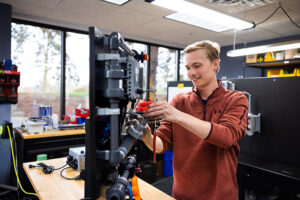Two faculty members, Dawn Erb in physics and Arash Mafi in electrical engineering, have received an Early Career Development (CAREER) Award from the National Science Foundation (NSF).
CAREER grants are the NSF’s most prestigious grants for younger researchers. They support the career development of teacher-scholars who are most likely to become the academic leaders of this century.

Assistant Professor Dawn Erb will use the nearly $800,000 grant, awarded over five years, to conduct research on galaxy formation and evolution in the early universe.
In order to learn more about the early stages of galaxy formation, Erb will study small, low-mass galaxies from a time when the universe was only 20 percent of its current age but galaxies are still bright enough to examine in detail. These super-star forming machines may contain information about the earliest galaxies in the universe, which are too faint for detailed study.
She will explore the composition of the galaxies and their interactions and exchanges of gas with their environment, called the “intergalactic medium.”
The galaxies she is targeting are about 10 billion light years away and much younger than our own Milky Way galaxy. One of the aims of the study is to characterize the early lives of these galaxies, using them as analogs for some of the most distant galaxies known. Erb expects the work will provide insights into the process of star formation in these very early galaxies.
Another component of the research will include examining “gravitationally lensed” galaxies, those that are far away but lie behind a cluster of galaxies. Because spacetime curves around massive objects, the gravity of the cluster magnifies galaxies behind it to appear distorted but also much brighter and easier to observe.
Erb received her Ph.D. in astrophysics from the California Institute of Technology. Before joining UWM in 2010, she completed a postdoctoral fellowship at the Harvard-Smithsonian Center for Astrophysics and a Spitzer Postdoctoral Fellowship at the University of California.

Assistant Professor Arash Mafi was awarded a five-year, $400,000 grant for his work investigating new optical methods of data transmission vital to Internet speed and security in the coming quantum computing and communication age.
Data transmission through optical fibers is the backbone of the Internet. Mafi’s research will explore and manipulate the quantum behavior of light propagation inside of optical fibers. The work will also include creation of devices that apply the knowledge to secure ultra-high data-rate transmission.
Inside optical fibers, which are the width of a human hair, photons affect the physical properties of the host material carrying it. This, in turn, affects the way the photons behave.
Mafi’s project will explore that interaction in order to generate and guide photons in multiple modes, or channels, through optical fibers with greater efficiency.
In order to accomplish this, his research will delve into the uncharted territory of generating “quantum-entangled photon pairs,” inside a multimode optical fiber. Quantum-entangled photons are highly unusual because their behavior is linked no matter how far they are apart.
Such technology will be essential for national security and U.S. competitiveness in developing the next generation of optical communication devices.
Mafi earned his master’s and doctoral degrees in physics from The Ohio State University and completed a postdoctoral appointment at the University of Arizona in the Optical Sciences Center. Before joining UWM’s College of Engineering & Applied Science in 2008, he was a senior research scientist at Corning Inc., the world’s largest manufacturer of optical fibers.



